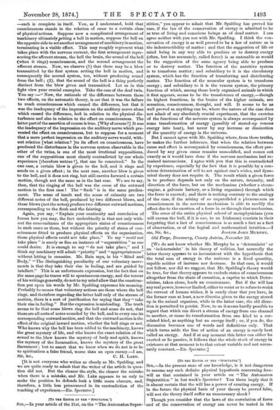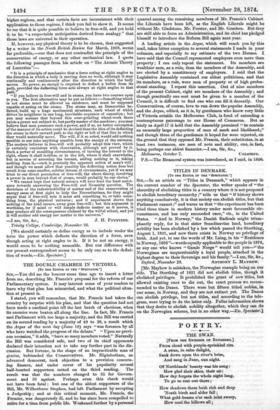[TO THE Earrea OF TEE "SPECTATOR.") SIR,—In the present state
of our knowledge, is it not dangerous to assume any such definite physical hypothesis concerning free- will as that contained in your article on "The Automaton Sulierstition " in last week's Spectator? You there imply that it is almost certain that the will has a power of creating energy. If in the future the physical basis of your theory be proved false, will not the theory itself suffer an unnecessary shock?
Though you consider that the laws of the correlation of force and of the conservation of energy can never be tested in the higher regions, and that certain facts are inconsistent with their application to those regions, I think you fail to show it. It seems to me that it is quite possible to believe in free-will, and yet hold it to be "a respectable anticipation derived from analogy" that those laws are universal in their operation.
If, however, any physical theory is to be chosen, that suggested by a writer in the North British Review for March, 1868, seems far preferable,—one that does not contradict the principle of the conservation of energy, or any other mechanical law. I quote the following passages from his article on "The Atomic Theory of Lucretius ":—
" It is a principle of mechanics that a force acting at right angles to the direction in which a body is moving does no work, although it may continually and continuously alter the direction in which the body moves. No power, no energy is required to deflect a bullet from its path, provided the deflecting force acts always at right angles to that path."
"If you believe in free-will and in atoms, you have two courses open to you. The first alternative may be put as follows :—Something which is not atoms must be allowed an existence, and must be supposed capable of acting on the atoms. The atoms may, as Demooritus be- lieved, build up a huge mechanical structure, each wheel of which drives its neighbour in one long, inevitable sequence of causation ; but you may assume that beyond this ever-grinding wheel-work there exists a power not subject to, but partly master of the machine ; you may believe that man possesses such a power, and if so, no better conception of the manner of its action could be devised than the idea of its deflecting the atoms in their onward path to the right or left of that line in which they would naturally move. The will, if it so acted, would add nothing sensible to nor take anything sensible from the energy of the universe. The modern believer in free-will will probably adopt this view, which is certainly consistent with observation, although not proved by it. Such a power of moulding circumstances, of turning the torrent to the right, where it shall fertilise, or to the left, where it shall overwhelm, but in nowise of arresting the torrent, adding nothing to it, taking nothing from it,—such is precisely the apparent action of man's will ; and though we must allow that possibly the deflecting action does but result from some smaller, subtler stream of circumstance yet if we may trait to our direct perception of free-will, tke above theory, involving a power in man beyond that of atoms, would probably be our choice."
"We cannot hope that natural science will ever lend the least assist- ance towards answering the Free-will and Necessity question. The doctrines of the indestructibility of matter and of the conservation of energy seem at first sight to help the Necessitarians, for they might argue that if free-will acts it must add something to, or take some- thing from' the physical universe ; and if experiment shows that nothing of the kind occurs, away goes free-will ; but this argument is worthless, for if mind or will simply deflects matter as it moves, it may produce all the consequences claimed by the wilful school, and yet it will neither add energy nor matter to the universe."
—I am, Sir, &c., J. H. POINTING.
Trinity College, Cambridge, November 26.
[We should certainly so define energy as to include under the term the power which deflects the direction of a force, even though acting at right angles to it. If it be not an energy, it would seem to be nothing nameable. But our difference with our present correspondent seems to be only one as to the defini- tion of words.—En. Spectator.]







































 Previous page
Previous page